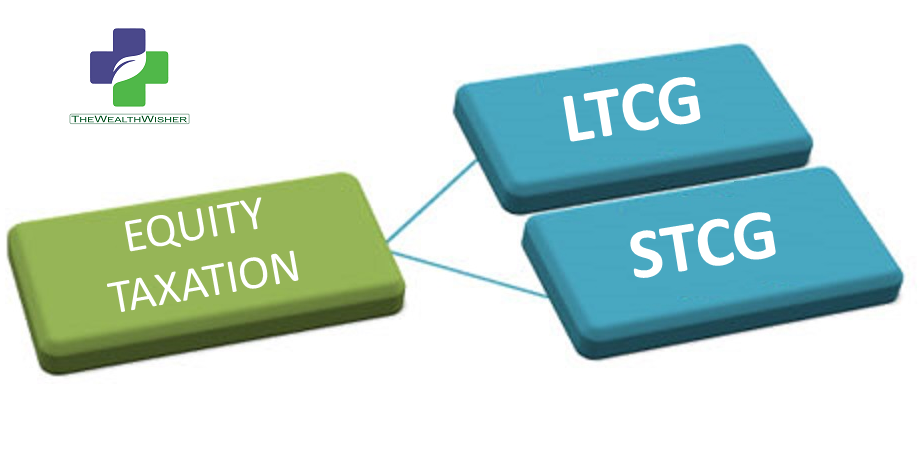Equity mutual funds have become very popular & a key investment asset. Withdrawal from equity-oriented mutual funds attracts tax. Also, the equity fund declares dividends. This article aims to give you clarity on capital gain/capital loss arising from equity mutual funds. Here is taxation on equity mutual funds in India. This is updated as per Finance bill 2020 for Financial Year 2020-21.
Taxation arises when you get gains or distribution by the mutual funds. So it important o understand when taxation arises in equity mutual fund investments.
Taxation on Equity Mutual Fund
When does tax liability arise?
Taxation on Equity Mutual Funds arises on sale of Mutual Fund units.
For example, an investor bought Mutual fund units on 1st Jan 2018 for a NAV of Rs 100. On 31st March 2020, the NAV stands at Rs 120 and the investor sells it. The liability will arise on 31st Mar 2020. This will be a gain of Rs 20 per unit.
What is construed as Sale from a tax standpoint?
Sale does not mean exiting only. Means sale does not mean that you finish the investment and money come to your bank account.
From a taxation point of view all these below transaction are called sale of units:
- Redemption of Equity Fund
- Switch from Equity Fund to Debt Fund
- Shifting (Switch) from one Equity Fund to other Equity Fund
- Changing from one option of the Equity Fund to other option of same Equity Fund (Dividend to Growth or vice versa)
- Switching from Regular Plan to Direct Plan or vice versa.
Update: from 1 April 2020 the dividends (payout & reinvest) are also taxable in hands of the investor for all categories of funds. So when a fund announces a dividend in an equity fund, you need to add it to your income of that year. This payout is different from capital gain and taxed as per the investor’s income slab. Read on for the details.
Any of the above transactions can lead to capital gain or a capital loss.
Taxation on Equity Mutual Funds
Step 1: To know the tax, first the gain needs to be classified as Long Term (LTCG) or Short Term Capital Gain (STCG)
If the investor has held on to the Mutual Units for more than 1 year, then it is treated as Long Term Capital gain (Or Loss – LTCL). If the investor has held on to the Mutual Fund Units for less than 1 year, then it is treated as Short Term Capital Gain (or Loss – STCL).
Step 2: Check for Grandfathering
Till 2018, the LTCG was tax-free. So if an investor has invested before 31 Jan 2018 he will not have to pay taxes till 31 Jan 2018. Gain achieved after 01 Feb 2018 till his exit date will be taken as LTCG.
Let me take a simple example. A person invested Rs 100 in equity mutual fund on 1 Jan 2010. He withdrew his investment on 01 Sept 2020 Which was Rs 180.
Now since he invested before 2018, his gain from 2010 to 2018 (suppose Rs 60) is tax-free. His remaining gains Rs 120 is his long term capital gain.
Step 3: Check if Long Term Capital Gain exceeds Rs 1 Lakh in the financial year?
If NO – The gains are tax-free.
If Yes Proceed to Step 3
Tax Rates for Equity Mutual Funds
Step 4: Now when you have classified gains as LTCG (Above Rs 1 Lakh) & STCG, the applicable tax rates are:
LTCG is taxed at a rate of 10% + surcharge + cess.
STCG is taxed at a rate of 15% + surcharge + cess.
Setting off Capital Gains & Losses in Mutual Funds
As per Section 70 of Income Tax Act, Short Term Capital Losses (STCL) can be adjusted against any Capital Gains (Short Term as well as Long Term) on other Equity Fund, Direct Equity, Debt Funds, Bonds, Structured Products, Gold, and Property.
The gain has to be in the same financial year or the loss.
 Long Term Capital Losses can be adjusted against only Long Term Capital Gains from any Capital Asset as mentioned above.
Long Term Capital Losses can be adjusted against only Long Term Capital Gains from any Capital Asset as mentioned above.
Also,
As per Section 74 of the Income Tax Act:
- Both Short Term and Long Term Capital Losses can be carried forward for next 8 years.
- The set-off provisions (asset class) as mentioned above Section 70 apply.
So to clarify,

Long Term Gains can be set off against only Long Term Losses of that financial year as well as Long Term Losses brought forwarded for last 8 years.Short Term Gains can be offset by Short Term Loss (from any of the assets as mentioned above) of that financial year or Long term losses of that financial year. They can also be offset with STCL brought forward for the last 8 years.
Taxation on Mutual Fund Dividends
From FY 2020-21, dividends distributed by equity & MFs will be taxable in the hand of the investor. This use to be tax-free until a year ago. But dividend issuing company use to deduct a tax called Dividend Distribution Tax (DDT). Here are the details – how Dividend is Taxed in MFs.
I hope this provides you clarity on Equity Mutual fund Taxation. Do contact me using the comments section below or through my email to explore your questions.










Best Blog to read: Taxation on Equity Mutual Fund in India